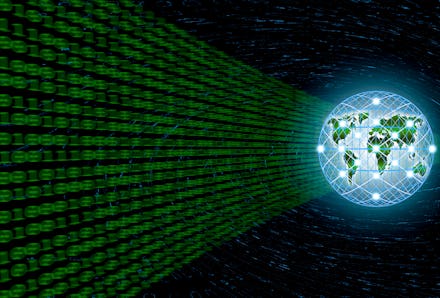Our massive amounts of data might bring about an "information catastrophe," a new study warns

The incredible amount of information produced by our computers and devices could amount to half the planet’s mass by 2245, warns a study released earlier this month. The situation threatens to create an "information catastrophe," according to the study's author, that uses energy to both create and destroy bits of data. The report, published in the journal AIP Advances, is based on a theory produced by its author, English physicist Melvin Vopson, that argues information is the fifth form of matter alongside solids, liquids, gases, and plasma. If his theory proves true, it would mean that digital information will eventually outnumber all the atoms on Earth and will require more and more energy to maintain.
"The question is: Where do we store this information? How do we power this?" Vopson explained to Live Science. "I call this the invisible crisis, as today it is truly an invisible problem."
What this would mean for the future of mankind is still unclear. Despite Vopson's use of words like "crisis" and "catastrophe," it's still unknown what the consequences of the abundance of information would be. One possible effect could be that half of the Earth's mass would become information within 300 years.
"I see this as a real problem," Vopson said to Live Science. "Just [like] burning fossil fuels, plastic pollution and deforestation, I think the information is something overlooked by everyone. We are literally changing the planet bit-by-bit."
Vopson's claims fall right into the realm of theoretical physics — a field that uses mathematical concepts to explain everyday phenomena. These concepts include Einstein's theory of general relativity, Landauer's principle, and Claude Shannon's information theory, which Vopson used to create his theory called the mass-energy-information equivalence principle.
"The mass-energy-information equivalence principle builds on these concepts and opens up a huge range of new physics, especially in cosmology," he told Inverse. "When one brings information content into existing physical theories, it is almost like an extra dimension to everything in physics."
It's a theory that might sound really wild to the layperson, but Vopson believes his predictions are solid.
"Since both special relativity and Landauer’s principle have been proven correct, it is highly probable that the new principle will also be proven correct," he told Inverse. "Although it is currently just a theory."